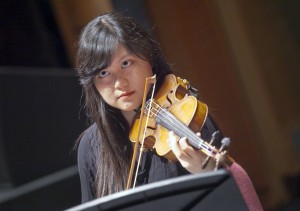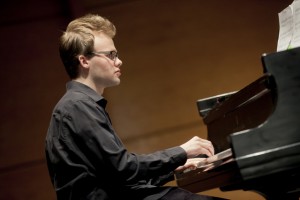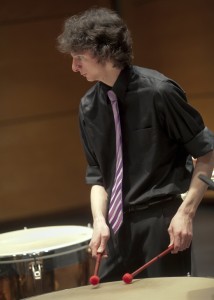On the first day of class, Kirk O’Riordan instructed the students in his Introduction to Composition course to raise their right hands and take an oath that they are not Beethoven, Mozart, or Brahms, but unique individuals with their own styles, and it is perfectly acceptable not to write like the classical composers whose works they have studied and played.

Sharon Chen ’15
That icebreaker exercise gave Sharon Chen ’15 (Norwood, N.J.) the courage to compose her first piece. Chen was among seven students in the course whose original works were featured when the College’s Contemporary Music Ensemble took the stage at the Williams Center for the Arts May 1 for a concert of music by Lafayette composers.
In O’Riordan, assistant professor of music, Chen found a supportive mentor who encouraged her creativity while pushing her out of her comfort zone. When she first started composing, she stuck to simple chords, but O’Riordan asked her to explore minimalism and serialism, a compositional style that she says she never would have attempted without the course. The result was “Dawn,” a serene, meditative piece reminiscent of the morning sun emerging and slowly rising.
“The first time we rehearsed the piece, I was very nervous. Writing my own composition felt like I was revealing a part of myself,” says Chen, a dual major in international affairs and French who has played violin with Contemporary Music Ensemble for three years. “It felt much more personal than writing a paper. And performing it was quite an interesting experience. Hearing it played live by my peers was very cool.”

John Gossick ’18
The course also was a first for John Gossick ’18 (Forest Hill, Md.). While he has composed a lot of jazz – he plays jazz piano and classical percussion – this was his first attempt at classical composition. O’Riordan’s “listening journal” assignments helped Gossick become more familiar with 20th century compositional techniques.
Gossick composed “Undulations” as a meditative piece inspired by the ebb and flow of ocean waves. Like Chen, he also pulled double duty at the concert as both composer and player. Playing music he has composed himself is far more rewarding than playing even the greats.
“It makes the performance more emotional and honest and gives me a chance to express myself in ways that playing a cover simply cannot,” he says.
The course went beyond composition. Michael Ryan ’15 (Pottsville, Pa.), who has performed with Contemporary Music Ensemble for four years, learned how important it is to strike a balance among the composer, performers, and audience. He was torn between wanting to write for the ensemble’s strengths and staying true to his musical vision despite it presenting more of a challenge to the players.
Originally, Ryan had not planned on performing with the ensemble for his piece, but plans changed as rehearsals progressed. Having composed “Scenes from the Arctic Circle” himself, it took the guesswork out of interpreting what the composer wanted. Weeks into rehearsal, he re-worked his own part.

Michael Ryan ’15
“When I’m standing behind the percussion, my mind’s focused on playing the notes in front of me, so I can’t get the full effect, but at least I get to control my part in the music,” says Ryan, a dual major in civil engineering and music. “It’s completely different from not playing – you’re putting your work in other people’s hands, sitting out in the audience sweating, just you and your thoughts.”
This summer, Ryan plans to play semi-professionally before heading to graduate school for environmental engineering. Chen will take a year off before pursuing graduate studies.
In addition to the student composed pieces, the ensemble performed excerpts from O’Riordan’s original “Twenty-Six Preludes for Solo Piano” with guest artist Holly Roadfeldt.


